Note You are currently viewing a previous version of this narrative statement as published in previous iterations of the KEF (KEF1 and KEF2). View the latest version
Institutional Context
Summary
Nottingham Trent University is a leading civic university and one of the largest universities in the country with 34,000 students. Knowledge exchange is at the heart of our 2020-25 strategy University, reimagined. Our theme of ‘Enriching Society’ has the ambition to be a widely acknowledged force for good in social, cultural and economic development. Our principles are that we change lives, we are bold, and we do the right thing.
We apply our research to local and global challenges, deliver teaching and learning that engages with our community and welcome access to our campuses. Knowledge exchange with our business, community and civic partners informs our thinking, enriches our work, and makes a demonstrable difference to the economy and society.
Institutional context
Nottingham Trent University (NTU) traces its origins to 1843 to the Nottingham Government School of Design, founded to support local manufacturers. As an anchor institution in the local economy, we have grown to meet the needs of employers and now have strong international reputation and impact.
NTU is one of the largest universities in the country with approximately 4000 staff, 34,000 students, and an annual turnover of £330m. The winner of three university of the year awards since 2017, NTU was also awarded the Queen’s Anniversary Prize for Higher and Further Education in 2015 for research in one of its strategic themes, ‘Safety and Security of Citizens’.
Knowledge exchange is fundamental to our 2020-2025 strategy, University, reimagined, developed through consultation with local stakeholders. Our ambition is to be a widely acknowledged force for good in economic, social and cultural development. Our principle is that we change lives by championing a civic, as much as an academic mission, and we are committed to our role helping to transform society.
Partnership is key to our mission. We have over twenty strategic partnerships with leading employers and over 6,000 global business connections. Collaboration with the University of Nottingham, local authorities, hospitals and the Local Enterprise Partnership has created a joint civic agreement, ‘Universities for Nottingham’. The first of its kind in the country, it has an action plan to improve economic prosperity, educational opportunity, environmental sustainability, health and wellbeing, as well as unlocking the universities to make meaningful change to the lives of local citizens.
We focus our research attention on challenges that are as relevant to our stakeholders locally and regionally as they are of global concern. Each year we undertake £4m of contract and collaborative research, and we are ambitious to translate our research and intellectual property to benefit our partners and society.
NTU is a significant provider of innovation infrastructure and we own the BioCity Group and Antenna business centre. We are constructing a £9m Enterprise Centre and a £23m dual-site Medical Technologies Innovation Facility at our Clifton Campus and in the Boots Enterprise Zone.
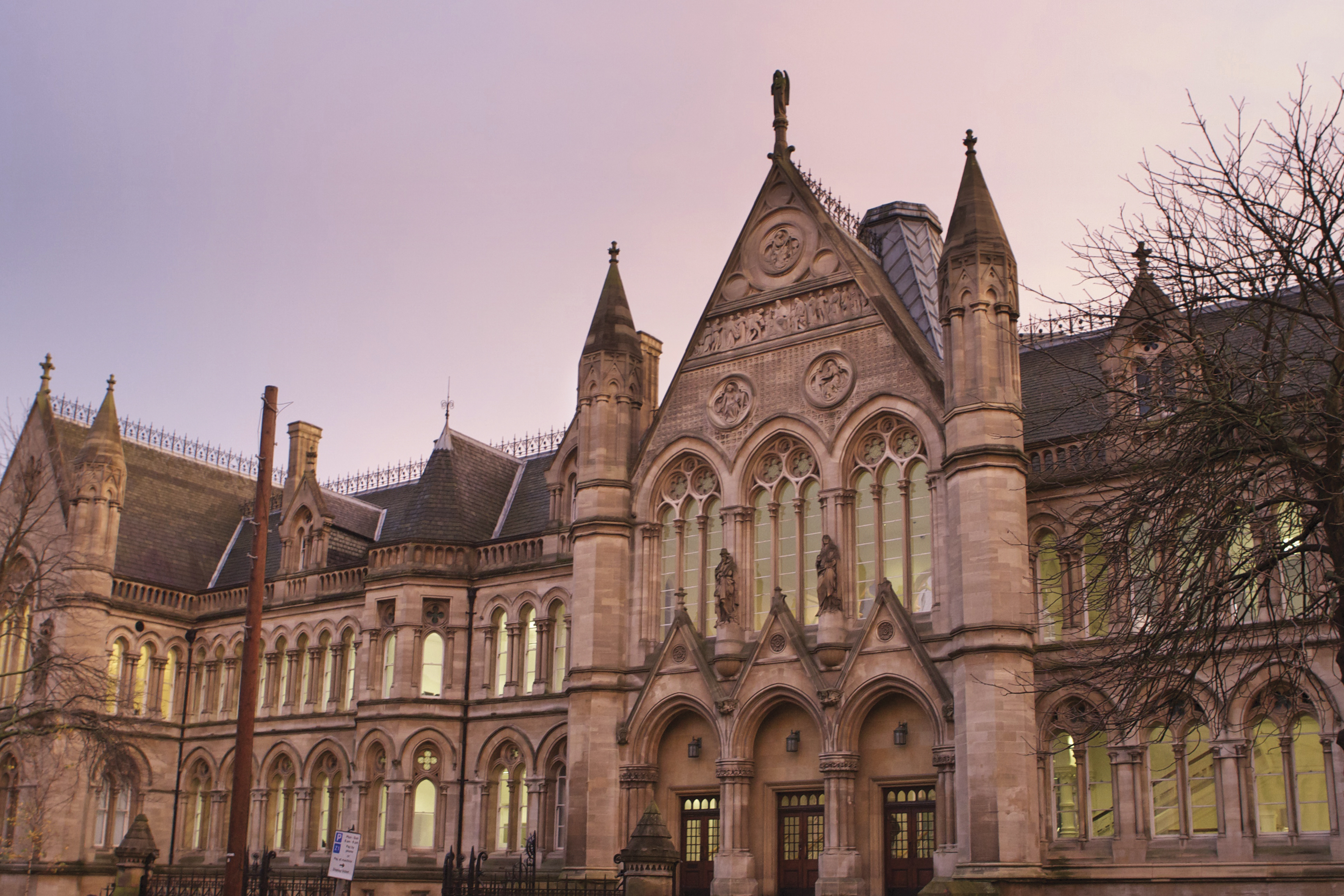
NTU’s Arkwright Building
NTU is a leading provider of Continuing Professional Development, with annual revenues of £5.5m. Through our ESF High Level Programmes we support those who are disadvantaged in the labour market.
We champion the role of students and graduates in knowledge exchange and have placed over 770 graduates into part-funded placements. We have one of the most comprehensive business innovation and growth programmes in the UK, from start-up to scale-up. This work has attracted £24.5m investment since 2016, providing direct support to over 1,500 business and 450 learners. Increasingly, our teaching programmes are enabling community engaged learning and our staff and students delivered nearly 140,000 hours of volunteering in the last three years.
We welcome public access to campus through distinguished lectures and a dynamic cultural programme at our Bonington Gallery and recently-opened music venues Metronome and the University Hall. Our sports facilities are also open for community use, with nearly 100,000 visits since 2017.
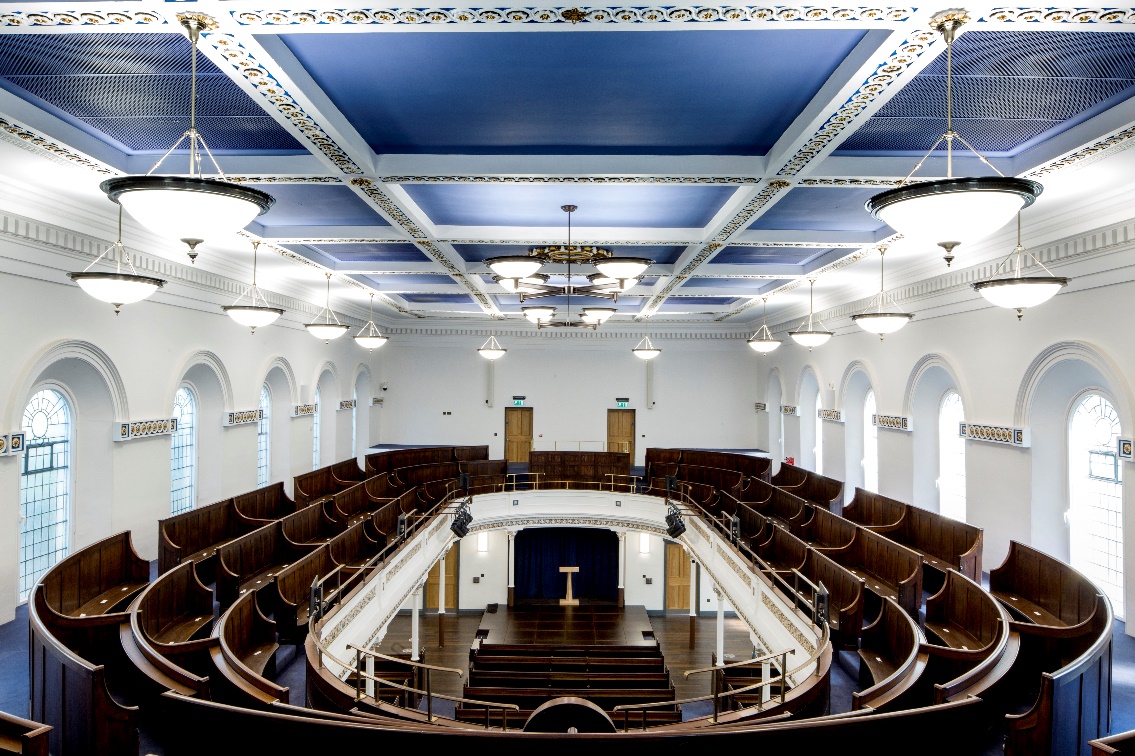
NTU University Hall
For further information, please send queries to jeremy.hague@ntu.ac.uk
Local Growth and Regeneration
Summary of approach
NTU is a leading civic university, delivering economic, social and cultural development. Our 2020-25 strategy, ‘University, reimagined’, has ‘Enriching Society’ as one of its six key themes, championing support for both large and small enterprises.
We provide economic analysis and research insight which supports policy development. Working closely with the D2N2 LEP, business representative organisations and local authorities we are delivering a comprehensive £54.7m ‘Start-up to Scale-Up’ growth, innovation and skills programme.
Our students and graduates acquire skills in enterprise and are supported to explore new business ideas.
The University is a major provider of innovation infrastructure; we develop strategic partnerships with local stakeholders and leading employers to provide access to high level skills, graduate talent, and research and innovation.
Aspect 1: Strategy
Local growth and regeneration.
Nottingham Trent University (NTU) traces its origins to the Nottingham Government School of Design, established in 1843 to support local manufacturers. For over 175 years, NTU has been an anchor institution in the local economy, growing in scale and adapting to meet local, regional, national and global needs and challenges.
Located in the East Midlands of England, the University works with economic agencies at a number of spatial levels: locally in the city and county, across the D2N2 Local Enterprise Partnership for Derby, Derbyshire, Nottingham and Nottinghamshire, and the Midlands Engine. At the Midlands level, we are member of the Midlands Enterprise Universities who are working together to drive productivity and growth.
The University’s 2020-25 strategic plan, ‘University, reimagined’ was developed through consultation with over 50 stakeholder organisations and makes a commitment to Enriching Society as one of six themes. Our strategic ambition is that: “We are an acknowledged force for good in economic, social and cultural development. We collaborate with those like us who want to address the key challenges of our times and our places.”
The Strategic Plan also outlines our approaches to supporting local and economic growth:
We will consolidate our position as a leading civic university by developing more and better structured opportunities of our students, colleagues and alumni to make meaningful contribution to the challenges faced by our local communities.
We will champion and support large and small enterprises to optimise their access to capable leadership, skilled graduates and the future-facing technologies necessary for them to thrive.
We will focus our research attention on challenges that are as relevant to our stakeholders locally and regionally as they are of global concern, partnering with outstanding institutions that share our aspirations and recognise our contributions.
Our local and regional context
The D2N2 Local Enterprise Partnership area has world-class advanced manufacturing with leading employers such as Rolls Royce, Bombardier and Toyota, and as a result there are more manufacturing jobs in D2N2 than any other LEP area. A growing life sciences sector in Nottingham is anchored by Boots and BioCity (owned by NTU and University of Nottingham). Nottingham is also home to Experian and Capital One and an associated emerging digital tech cluster in and around Nottingham’s creative quarter.
Three universities are based with D2N2, and we collaborate to support a vibrant innovation ecosystem with three science parks and over ten innovation centres home to numerous innovative SMEs. D2N2 has excellent national and international transport linkages. The M1 runs through the area, close to East Midlands Airport, second to Heathrow in terms of total cargo. This is attracting major investments in warehousing and logistics infrastructure.
While the region is home to large, world-class organisations and their supply chains, it is characterised as a low-skill and low-wage economy. Disproportionate levels of the workforce participate in low skill roles. GVA per hour worked is 14% below the UK average, a gap that has widened over the last five years. It is estimated that 54,000 jobs are at risk of disappearing through automation, with a further 413,000 likely to be impacted in some way. Other key challenges include a high proportion of social mobility cold spots, an above average concentration of energy intensive industries and poor East-West regional rail connectivity. While the East Midlands is a business-led innovation region with business investment in R&D at or above the UK average there is a historic low level of public investment.
A recent Science and Innovation Audit (2018) identified four market opportunities based upon world-leading university research, major private sector business and SME supply chains. These are: Next Generation Transport, Life Science and Healthcare, Future Food Processing and Energy and Low Carbon.
Supporting local policy and partnership
NTU is represented at a senior level in local economic governance structures including the Board of D2N2, the D2N2 Business Growth and Innovation Advisory Board, D2N2 Covid-19 Response Board, the Local Resilience Forum and the Nottingham Growth Board.
NTU has been instrumental in the development of the D2N2 Strategic Economic Plan and Draft Local Industrial and Recovery Strategy. Economists in Nottingham Business School are partners in the Midlands Engine Economic Observatory ,and during the pandemic they have undertaken ongoing economic analysis for the D2N2 Covid-19 Response Board. In addition, a team in the School of Social Sciences are providing academic insight into the C19 National Foresight Group on policy issues including homelessness, domestic violence and mental wellbeing.
NTU works closely with local policymakers and local government to support the prosperity of the city and county. Through local stakeholder consultation, we have co-designed a Universities for Nottingham Civic Agreement, the first civic agreement of its kind in the UK. The Agreement has an action plan to make meaningful change to the lives of local citizens. This work will be delivered across five themes: Economic Prosperity, Educational Opportunity, Environmental Sustainability, Health and Well-being, Unlocking the Universities for Nottingham and Nottinghamshire.
Aspect 2: Activity
NTU invests significantly in economic development. Current programmes have a combined value of £54.7m, delivered through the European Structural Investment Funding, Local Growth Programme and Research England. We have provided direct support to over 1,500 business in the last three years
Innovation infrastructure.
The University was a founding partner of BioCity, one of Europe’s leading life-science incubators. BioCity now operates MediCity and facilities in Glasgow and Cheshire. Over 800 people are based on the Nottingham city centre site in 70 tenant companies.
A £23m dual-sited Medical Technology Innovation Facility (MTIF) is being built on our Clifton Campus and on the Nottingham Enterprise Zone. MTIF will accelerate the development, clinical production and commercialisation of new medical technologies.
The Hive offers support and expertise to assist entrepreneurs to turn business ideas into reality. It supports nearly 2,000 students a year. The Hive will be incorporated within the £8m Dryden Enterprise Centre which opens in spring 2021.
Antenna Media Centre provides practical support, meeting spaces and networking for 400 businesses operating across the creative industries in Nottingham’s Creative Quarter.
Metronome is a UK-leading centre for music, moving image, video games, live performance and the spoken word and creates a platform for local artists, future artists and technicians.
Business support, high level skills and innovation
The University is a leading provider of business growth and innovation services in D2N2. We work with businesses at each stage of their maturity from Start-Up to Scale-Up. Through business diagnostics, expert workshops and individually-tailored assistance, the University supports businesses to upskill their workforces, access graduate talent and to innovate, through cutting-edge research and world-class facilities and expertise.
Business start-up and growth. The Hive supports business idea evaluation and start up as well as providing business accommodation. Our acceleration and growth programmes are delivered by Nottingham Business School, accredited by EQUIS and AACSB. It is listed amongst the Top 100 European Business Schools by the Financial Times. NBS holds the Small Business Charter and its £964K Upscaler programme, which targets ambitious and scale up businesses, is delivered in partnership with the East Midlands Chamber of Commerce and works with a network of 220 growing SMEs.
Driving innovation. NTU provides significant support for innovation. The £7.2m Enabling Innovation Programme (2016-19) assisted 705 business and placed 238 graduates into SMEs to develop new products and services. Our Design Matter research group delivers the £4.68m Impacting Business by Design programme to commercialise business design innovations. The £3m Big House programme drives business acceleration in the creative and digital industries, working with over 200 businesses. Productivity through Innovation, delivered with the universities of Derby and Nottingham, will enable NTU to work with over 60 businesses to improve their productivity through intensive knowledge exchange. The programme measures SME productivity before and after our intervention to inform a ‘what works’ perspective. The University also provides innovation support to businesses through contract and collaborative research, including KTPs offering funded partnerships with academics and researchers, consultancy and facilities and equipment related services.
Creating high level skills. NTU is a leading provider of Continuing Professional Development for business (c.£5.5m annually). Through the European Social Fund, NTU leads a local consortium of FE and HE partners in a £9.5m High Level Skills programme which is improving the skills of over 1,000 individuals and 700 businesses. Our work includes accredited programmes in women in leadership, sustainability and marketing. NTU has worked with a broad range of businesses and a recent audit found that just under a fifth of the businesses were Black-led.
Students and graduates supporting innovation in business
Our students and graduates play an important role in knowledge exchange, and placements are integrated into our economic programmes. We have facilitated 773 part-funded graduate placements in the last three years. Our Employability Team supports companies to recruit graduates, often for the first time.
Nottingham Law School’s Legal Advice Centre has provided 1,077 students with the opportunity to work on 777 cases since 2017. The Centre operates as a fully regulated law firm. It has recovered £3m in claims and compensation for local people who cannot afford legal representation.
Local development programmes
Creative Quarter Company. We co-own and invest in the Creative Quarter Company, an economic development agency supporting the growth of the creative and digital industries and regenerating the inner city.
Nottingham Smart City. The two Nottingham universities fund a role in the City Council to support joint working to address local challenges. Recent activity includes Remourban, a five-year EU ‘lighthouse’ project to address sustainability in transport, energy and housing which supported the retrofitting of 400 homes in the City. This work has been adopted as an exemplar by the British Council.
The Mansfield & Ashfield Programme. Following co-convened conferences with local leaders, businesses and stakeholders, a holistic programme of work is being delivered to support economic prosperity, improve local educational outcomes, and support social and cultural development.
Industry links
NTU is a strategic partner of the East Midlands Chamber and has close working relationships with the CBI, FSB, IOD and Make UK and other business networks and industry bodies. We have strategic partnerships with leading employers.
Aspect 3: Results
Outputs:
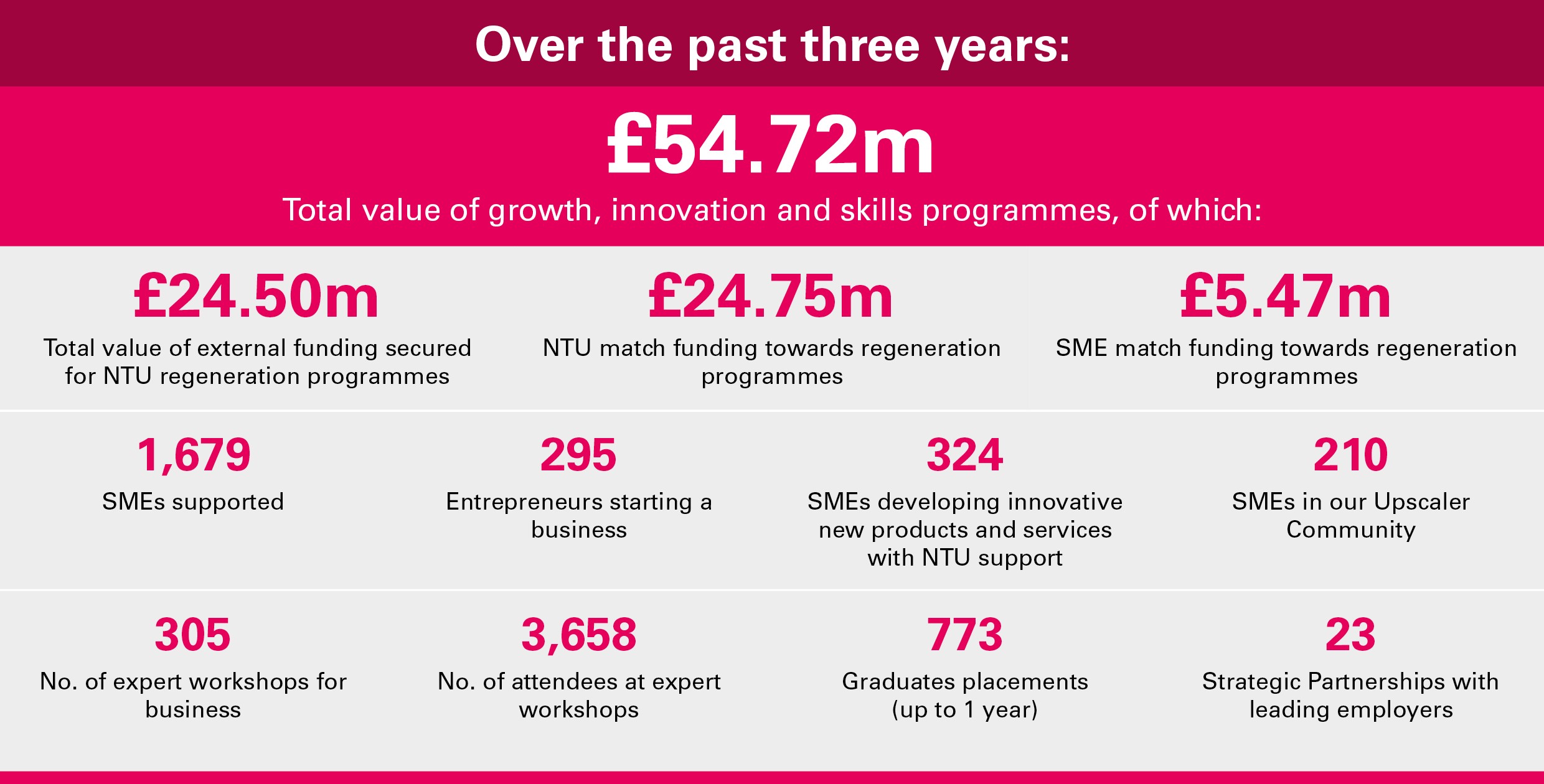
Outcomes:
We have created a dynamic cluster of entrepreneurs. The Hive has worked with over 21,573 entrepreneurs and supported the creation of 199 businesses. Businesses which graduate from the Hive have an average three-year survival rate of over 85% and collectively turnover £20m in the local economy
We have improved the local innovation eco system – 238 graduates have been employed by local business to support specific innovation projects. Many businesses had never employed a graduate before.
A growing network of scale-up businesses - 220 local SMEs are active members of our Upscaler Community, sharing ideas and collaborating to grow their businesses.
Expert advice to support economic and social planning during the pandemic. NTU contributes to fortnightly monitoring reports on the economic impacts of Covid-19 for the Midlands Engine Partnership and for the D2N2 Economic Recovery Analytical Group supporting pandemic and economic recovery planning. NTU social scientists contribute to the C19 National Foresight Group. Through the development of bespoke reports and an app, NTU has created a new mechanism for Local Resilience Forums, local authorities and recovery cells to learn about Covid-19 and share good practice.
The creation of a Nottinghamshire ‘Futures Forum’ which is creating new dialogue between academic and local authority policy makers on topical issues and local challenges.
What works - creating a better understanding of the outcomes and outputs of our work in enriching society.
NTU is aligning research to create ‘what works’ insights. Our ambition is to develop collaboration between D2N2 partners, businesses and universities to better understand the efficacy of our interventions, foster experimentation and share good practice. In doing so, we will support evidence-based policy and demonstrate the return on public investment.
For further information, please send queries to jeremy.hague@ntu.ac.uk
Public & Community Engagement
Summary of approach
NTU is a leading civic university, delivering economic, social and cultural development. Our 2020-25 strategy University, reimagined has Enriching Society as one of its six themes. We engage stakeholders to identify challenges and to make meaningful contributions to communities locally and further afield.
We invest in strategic partnerships. We research issues of social and economic relevance. Through placements, projects and volunteering, we apply our expertise to make a difference.
We promote public access to our facilities to participate in our activities. We harness the creativity of our students and colleagues to increase the reach, diversity and recognition of local arts and heritage.
We work with disadvantaged communities providing education that supports social cohesion and skills for changing careers.
Aspect 1: Strategy
NTU’s 2020-2025 strategic plan, University, reimagined, was launched in 2020. Its six themes outline our ambitions and approaches to: i) Creating Opportunity for our stakeholders, ii) Valuing Ideas and developing our research, iii) Enriching Society by economic, social and cultural development, iv) Embracing Sustainability, v) Connecting Globally and vi) Empowering the People who work in the University.
Public and community engagement is fundamental to our strategy, which was developed through consultation with 50 community stakeholders. University, reimagined makes specific public and community engagement commitments, aligned to wider institutional objectives:
We will focus our attention on challenges that are as relevant to our stakeholders locally and regionally as they are of global concern, partnering with outstanding institutions that share our aspirations and recognise our contributions. (Valuing Ideas)
Our ambition is to be a widely acknowledged force for good in economic, social and cultural development. We collaborate with those who, like us, want to address the key challenges of our times and places. (Enriching Society)
We will consolidate our position as a leading civic university through developing more and better structured opportunities for our students, colleagues and alumni to make meaningful contributions to the challenges faced by our local communities. (Enriching Society)
We will make an exemplary contribution in harnessing the creativity of our students and our colleagues to increase the reach, diversity and recognition of City, County and the wider region’s arts and heritage. (Enriching Society)
We will challenge our own assumptions about our roles and relationships in providing education and skills as a route to social cohesion within and beyond our hinterland. (Enriching Society)
Our public and community engagement is articulated in five themes:
Civic University – participating in and shaping the civic life of our city and county;
Teaching, research and the local community – aligning our core activities to the needs of the local community;
Place making and culture – Through investment in the public realm, contributing to the vibrant arts and culture of the region, and welcoming the wider community into the life of the University;
Tackling disadvantage through education - working with schools, colleges and employers to increase life chances and lifelong learning;
Growing civic leadership and volunteering – facilitating our staff and students to support disadvantaged communities.
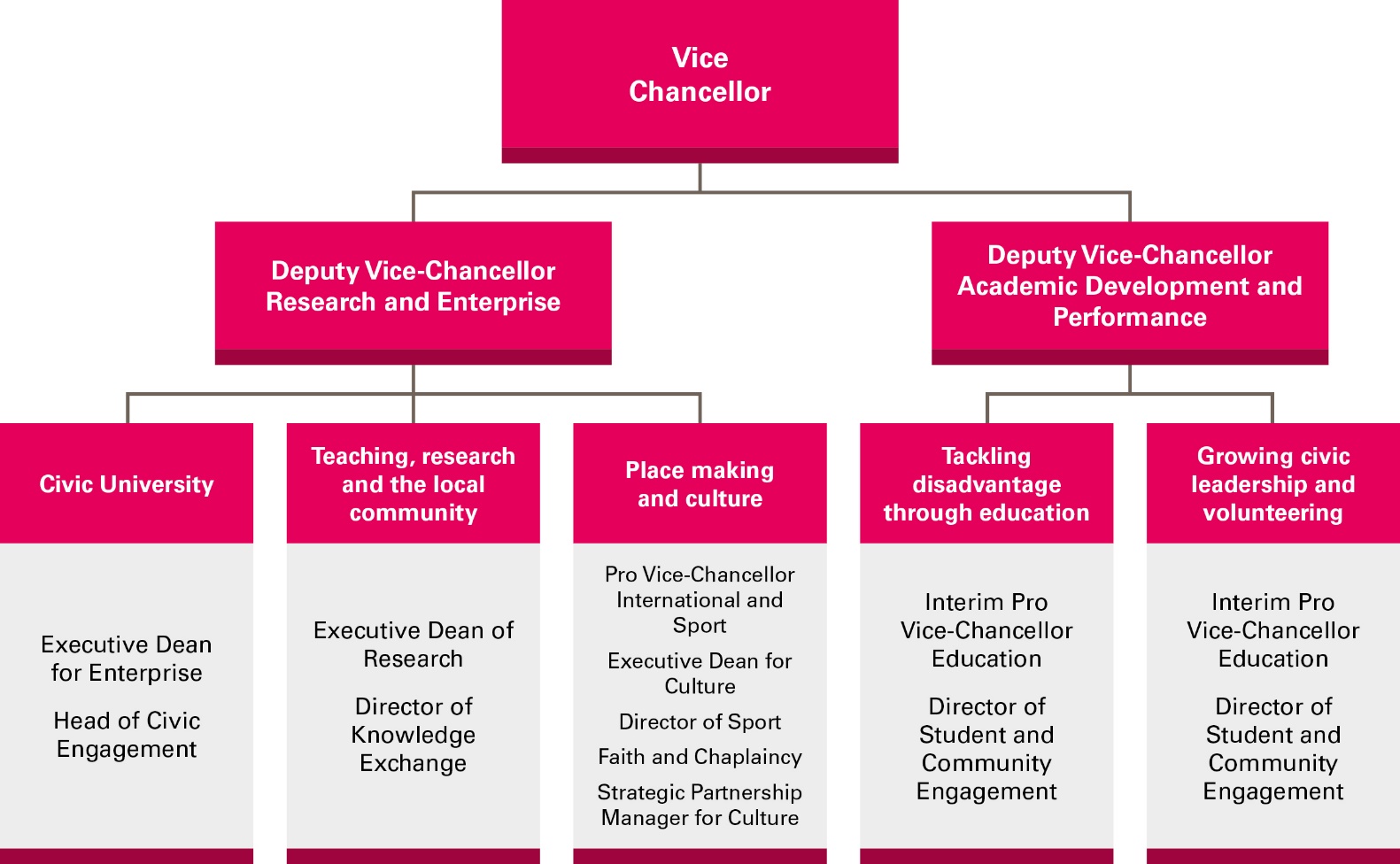
Aspect 2: Support
Strategic knowledge exchange – sponsored by the University’s Executive Team. The University Executive Team proactively supports the University’s engagement with civic leaders and community organisations. Defined programmes of work, led by senior university staff, are resourced to enable wider participation of NTU colleagues and students.
NTU-wide support – Dedicated institutional support is provided to facilitate public and community engagement.
NTU Culture produces the University’s public cultural programme. NTU makes significant annual investments in local cultural organisations financially and in kind.
The Centre for Student and Community Engagement leads NTU’s engagement with schools, community organisations and oversees an ambitious staff and student volunteering programme.
The Knowledge Exchange Team works with local authorities and SMEs, and manages short courses, providing access to continuing education.
NTU Events and Conferences organise the distinguished lecture series and professorial lectures that are open to the public.
NTU Sport offers public and community access to sporting facilities.
Notts TV provides community TV for Nottinghamshire residents and a platform to showcase the work of the University.
The Communications Team provide public information about the University.
School / departmental level – Public and community engagement is embedded within our teaching programmes. For example, the “Give Back Week” organised by Nottingham Business School and the Co-Lab run by the School of Art and Design provide community volunteering opportunities.
Individuals – NTU has a structured employee volunteering and community engagement scheme involving c.600 staff a year. The University grants paid time off work to participate in voluntary action and individuals are supported to participate in other public duties.
We invest in excess of £2.5m annually in public and community engagement. This figure excludes the in-kind contributions of academic and professional service staff.
CPD and training
Our work is led by public and community engagement specialists. Training is provided for volunteering activities. In addition, the Trent Institute for Learning and Teaching (TILT) holds an annual conference which enables lecturing staff to exchange good practice in teaching methods that support community engagement. A UK workshop on Community Engaged Learning was co-delivered with other university partners in May 2020.
How NTU recognises and rewards public and community engagement
NTU has a specific pathway for staff who focus on practice which has equal status with research and scholarship. Within the practice pathway there is specific acknowledgement of outreach activities for the public and for developing projects with external partners; this is reflected in objective-setting and annual appraisals/reward.
Our annual Vice-Chancellor’s Awards for Outstanding Practice provide additional investment in external engagement. In addition, staff and student volunteering is celebrated in an annual ceremony.
Aspect 3: Activity
Civic University actions
The University plays a leading civic role. It has senior representation in local governance including the D2N2 Board, One Nottingham and the Chief Officer’s Forum of Nottinghamshire County Council.
Universities for Nottingham - NTU makes a £1.5 billion contribution to the UK economy, and the impact of the two universities is significant. Following extensive consultation with local stakeholders, a new Civic Agreement has been developed between the two universities, local authorities and health trusts. The Agreement will improve local educational opportunities, economic prosperity, health and wellbeing and environmental sustainability. It is the first of its kind in the UK.
The Mansfield and Ashfield Programme aims to transform local educational outcomes, enhance culture, deliver economic prosperity and make meaningful change to local people. The programme was designed following co-convened conferences with local leaders, businesses and stakeholders.
Teaching, research and the local community
Public and community engagement is embedded across the University’s teaching and research. Our students work on local community challenges within their teaching. Specialist centres include:
Nottingham Civic Exchange which links research to community needs and has published policy reports on ordinary working families and good work.
C19 National Foresight Group. The School of Social Sciences is providing academic insight into the C19 National Foresight Group on policy issues including homelessness, domestic violence and mental wellbeing.
The Legal Advice Centre is a teaching law firm that has delivered £3m in claims and compensation benefits to the local community in 777 cases in the last three years.
The Nottingham Centre for Children, Young People and Families is evaluating the £45m Small Steps Big Changes programme to improve the lives of Nottingham’s young people.
Festival of Science and Curiosity had 20,500 participants attend 121 events since 2018.
Safer Living Foundation is a joint venture between HMP Whatton and NTU which is preventing sexual crime.
Place making and culture
Curated & Created programmes public cultural events at the Bonington Gallery, Metronome (music, comedy and spoken word) and University Hall (classical music). Our cultural programme has attracted audiences of 76,099 since 2017. We support the development of local artists, host the Cultural Education Partnership for Nottingham and invest substantially in NottsTV – the local community television station with 173,000 viewers – which we own. NTU also contributes to the sporting life of the region by supplying players, coaching and technical expertise to leading clubs across a range of sports.
Tackling disadvantage through education
NTU’s Centre for Student and Community Engagement (CenSCE) is a dedicated resource to support communities that have low rates of progression to higher education. It works with parents and carers, teachers engaging with 300 schools and 30,000 school children a year. CenSCE is a partner in TASO, undertaking research to understand how universities support social mobility. The University provides continuing education through its Creative Short Courses accessed by over 1,884 people, and we work with those disadvantaged in the labour market through the £9.5m European Social Fund programme benefitting nearly 1,000 individuals.
Developing civic leadership and supporting volunteering
The University encourages and facilitates volunteering by students and NTU staff.
Activities include:
ClickSilver – mentoring older people in computer skills
Right to Read – supporting child literacy
Community Volunteering – providing nearly 163,000 hours in heath, sustainability, criminal justice, education, sports and culture projects.
Saturday Arts Club – free art classes for children.
Aspect 4: Results and learning
Outputs
As outlined in our strategic plan, public and community engagement is embedded within all of the University activities. The University collects key performance indicators at a departmental level.
Cultural programme

Open lectures/degree show exhibitions

Community engaged learning

Public participation in sport

Volunteering and community outreach delivered by the Centre for Student and Community Engagement (CenSCE)
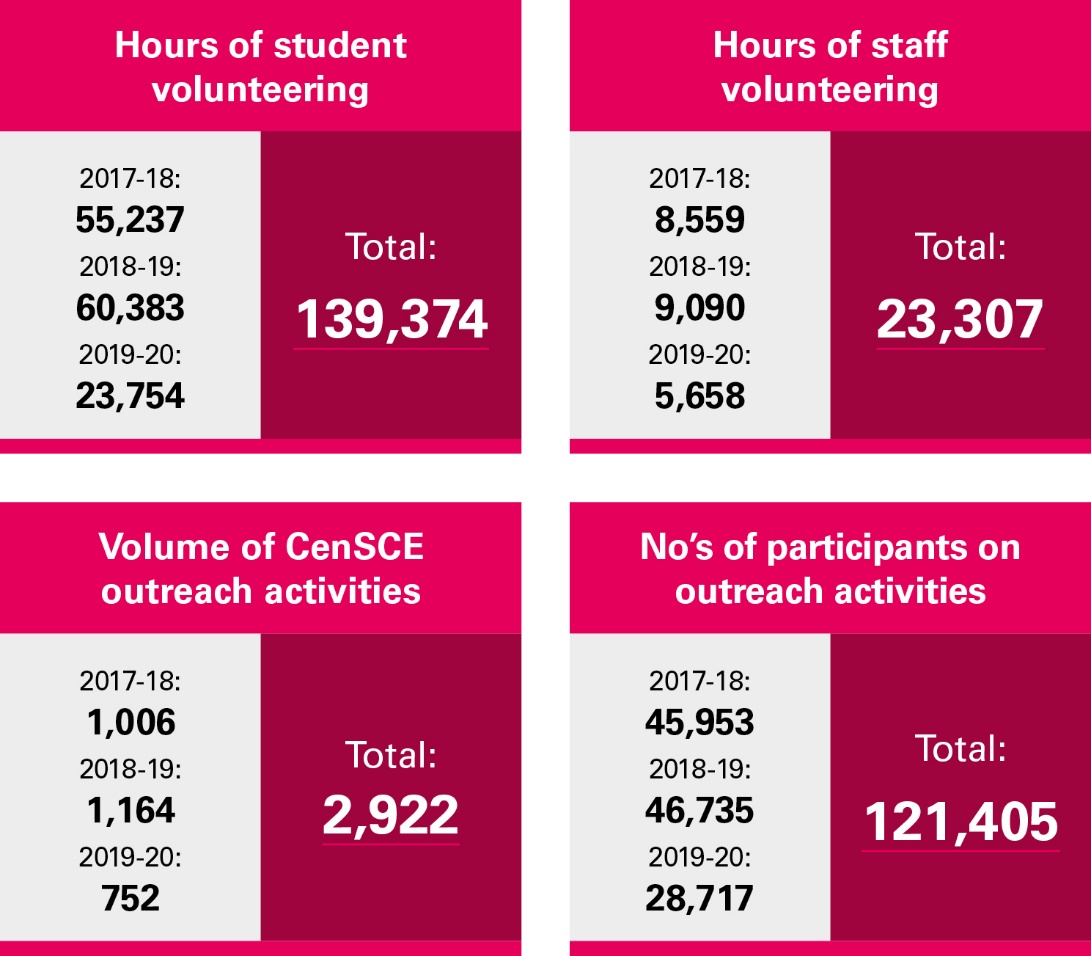
Outcomes
The creation of the Universities for Nottingham Civic Agreement defining a joint programme of action to enhance the life of the city and county.
New levels of engagement and partnership working with stakeholders in Mansfield and Ashfield to deliver transformational change in education, the economy and the community.
Metronome and the University Hall are two new cultural venues, benefitting the city and supporting a new public music programme curated by the University.
A dynamic cultural programme is bringing world-leading artists to Nottingham and supporting collective development with our cultural partners.
A growing number of students from low socio-economic backgrounds engaging in educational and other development opportunities. Our systematic evaluation is demonstrating that participating Key Stage 4 pupils achieve higher GCSE grades than the average for their school.
Pupils from disadvantaged backgrounds benefitting from NTU’s outreach programmes were more than twice as likely to enter HE than their non-participating counterparts.
NTU social scientists have contributed to public policy supporting pandemic planning and recovery. Through the development of bespoke reports and an app, NTU has created a new mechanism for Local Resilience Forums, Local Authorities and recovery cells to learn about Covid-19 and share good practice.
The Legal Advice Centre has recovered or defended £3m for its clients between since 2018.
The Safer Living Foundation is reducing the reconviction rates of sexual offenders. It won a Guardian University Award in 2016 and the award for Charity of the Year 2019 at the Third Sector Awards.
Aspect 5: Acting on results
Public and community engagement is fundamental to the strategy of the University.
We report and review this activity:
At an institutional level
At our Board of Governors through ‘deep dive’ papers on our strategic themes and actions.
At the University Executive Team for university-wide programme activity.
At a departmental level
Our specialist public and community engagement teams have departmental workplans which contribute to NTU’s Strategic Plan. Objectives and KPIs are reviewed through bi-annual Performance, Development and Contribution Reviews.
To our external partners and stakeholders
Significant amounts of our public and community activity is co-designed and co-delivered. There is on-going and reflexive dialogue on our joint work through civic leadership functions, programme boards and the Community Advisory Board of CenSCE. Our collaboration with our strategic partners is governed by a compact agreements and regular reviews. Examples of publicly available reporting on public engagement include:
Social and economic impact of the Universities for Nottingham
Case studies of the work of the Universities for Nottingham
Case studies of the work of the CenSCE
Legal Advice Centre annual reports
Action research and an understanding of ‘what works’.
NTU has made a strategic commitment to focus research upon local issues. As our public and community engagement grows, we are embedding action research within our programmes to evaluate the efficacy of our work and to support evidence-based interventions. We are partners in TASO (Transforming Access and Student Outcomes in Higher Education) which has created an evidence and evaluation methods toolkit support its work in eliminating equality gaps in higher education. In our Mansfield and Ashfield programme, we undertake action research to support local communities. The Universities for Nottingham Civic Agreement is committed to “establish a local SAGE group of experts to provide high-quality evidence-based policy advice, on a ‘what works’ approach”.
For further information, please send queries to jeremy.hague@ntu.ac.uk